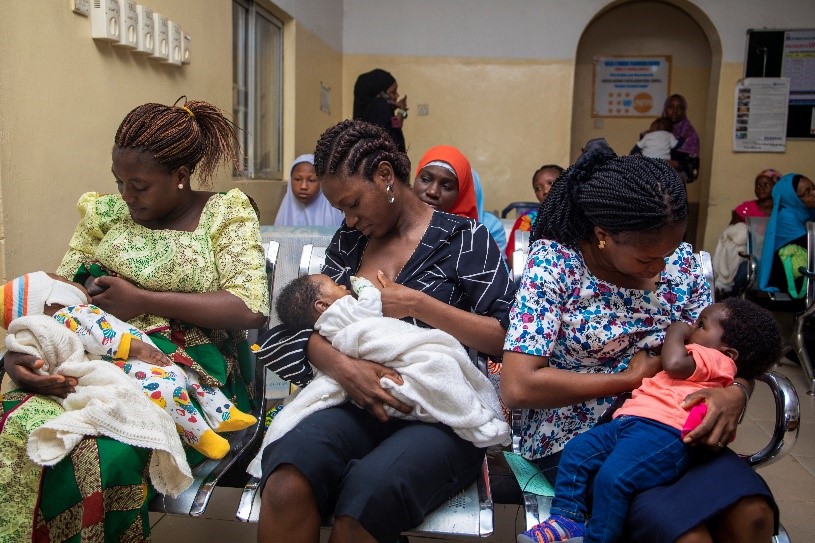
The 2024 Nigeria Demographic and Health Survey (NDHS) has revealed troubling statistics on infant and young child feeding practices across the country, showing that only 35.5 percent of children born within two years of the survey were put to the breast within one hour of birth.
The report also found that just 12.4 percent of children aged six to 23 months met the minimum dietary diversity standard, having eaten from at least five of the eight recommended food groups.
The findings raise serious concerns about the country’s progress on infant and young child feeding (IYCF) and its implications for child survival and development. According to the NDHS, exclusive breastfeeding among children aged 0–5 months, based on a sample size of 2,734, stands at 28.8 percent. While this shows improvement from about 2 percent in 1990 to 29 percent in 2018, the rate has largely stagnated since then.
These figures remain far below global averages. Data from multiple low- and middle-income countries show that early initiation rates are around 50 percent or more, while exclusive breastfeeding rates average 45 percent. Health experts warn that the low rates in Nigeria highlight persistent gaps in maternal and child nutrition practices that threaten the survival, growth, and development of young children.
Among children aged six to 23 months (sample size: 7,611), the NDHS found that only 12.4 percent met the minimum dietary diversity threshold. Meanwhile, 41.2 percent of toddlers consumed sweet beverages, and 23.7 percent were fed unhealthy foods high in sugar, salt, or unhealthy fats. In practical terms, this means that only about one in eight toddlers is receiving diverse complementary foods, while nearly half consume sweetened drinks and about one in four eat unhealthy foods.
According to the World Health Organisation (WHO), poor infant feeding practices are the leading cause of malnutrition in all its forms, including wasting, stunting, and underweight, as well as deficiencies and obesity, which often coexist in the same population. WHO and UNICEF guidelines recommend early initiation of breastfeeding, exclusive breastfeeding for the first six months, and the introduction of safe, nutrient-rich complementary foods from six months while continuing breastfeeding up to two years or beyond.
However, Nigeria’s performance falls well short of these global benchmarks, leaving children exposed to higher risks of illness, poor growth, impaired cognitive development, and long-term health complications.
Zainab Sa’idu, an expert in s3xual reproductive and maternal and newborn health, said the figures revealed major weaknesses in Nigeria’s infant feeding practices. “Essentially, it means many newborns remain at increased risk of infections and malnutrition, both major drivers of infant mortality,” she said.
She added that although the situation is concerning, it presents opportunities for scaling up breastfeeding support in hospitals, communities, workplaces, and homes. “This can be done through policies and environments that support both the mother and the newborn,” she said.
Ms. Sa’idu identified multiple barriers to exclusive breastfeeding, including delayed initiation of skin-to-skin contact after birth, limited counselling in health facilities, cultural beliefs discouraging exclusive breastfeeding, and inadequate knowledge of its benefits. “Professional and working mothers also face a lack of workplace support for nursing or partial implementation of the nationally recommended duration for maternity leave,” she explained.
For older infants, Ms. Sa’idu noted that the NDHS data show a worsening nutrition gap, with many toddlers lacking access to diverse diets. “Food insecurity is a major issue. Families are turning to cheaper processed foods, and the poor implementation of nutrition-centred policies, especially at community and primary health-care levels, is compounding the problem,” she said.
She emphasised that improving diet diversity will require making nutritious foods more affordable, increasing public awareness, and strengthening the enforcement of policies that promote healthy eating habits among young children. “Nigeria must reposition infant and young child feeding not merely as a health message but as a social norm that is acceptable and supported by everyone in the home, community, and workplace, including men,” she said.
Ms. Sa’idu called for stronger enforcement of maternity-leave policies and the creation of lactation spaces in both formal and informal sectors. “There is also a need to work with communities and media to promote messaging on the benefits of breastfeeding and diverse complementary feeding using simple language and local context,” she added.
WHO estimates that optimal breastfeeding alone could save more than 800,000 children under the age of five globally every year. In Nigeria, where child malnutrition remains a leading cause of under-five mortality, poor infant and young child feeding practices continue to amplify existing vulnerabilities and threaten the nation’s progress toward healthier childhood development.



